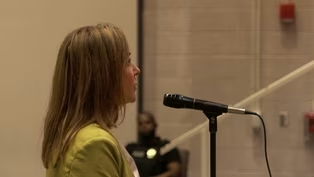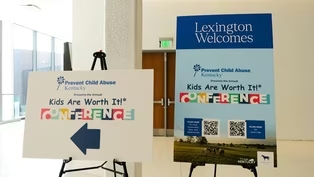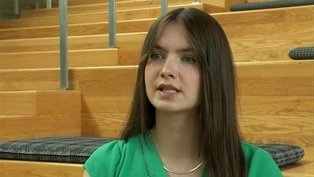
Saint Elizabeth Social Workers
Clip: Season 3 Episode 73 | 3m 22sVideo has Closed Captions
Northern Kentucky doctors and social workers partner to help more people get counseling.
Primary care physicians are at the front line of treating mental health. A doctor you see for an annual checkup or a sick visit is just as likely to prescribe antidepressants as a psychiatrist. Because of that, doctors are tag teaming with social workers at primary care offices across the Saint Elizabeth system in Northern Kentucky.
Problems playing video? | Closed Captioning Feedback
Problems playing video? | Closed Captioning Feedback
Kentucky Edition is a local public television program presented by KET

Saint Elizabeth Social Workers
Clip: Season 3 Episode 73 | 3m 22sVideo has Closed Captions
Primary care physicians are at the front line of treating mental health. A doctor you see for an annual checkup or a sick visit is just as likely to prescribe antidepressants as a psychiatrist. Because of that, doctors are tag teaming with social workers at primary care offices across the Saint Elizabeth system in Northern Kentucky.
Problems playing video? | Closed Captioning Feedback
How to Watch Kentucky Edition
Kentucky Edition is available to stream on pbs.org and the free PBS App, available on iPhone, Apple TV, Android TV, Android smartphones, Amazon Fire TV, Amazon Fire Tablet, Roku, Samsung Smart TV, and Vizio.
Providing Support for PBS.org
Learn Moreabout PBS online sponsorshipfeaturing all things German at Goebel Park.
Primary care.
Physicians are at the frontline of treating mental health.
A doctor you see for an annual checkup or sick visit is just as likely to prescribe antidepressants.
As a psychiatry issed because of that, doctors are tag teaming with social workers at primary care offices across the Saint.
Elizabeth Healthcare system in northern Kentucky.
It's getting more people into counseling.
He should sell their primary care doctors.
A lot of information.
>> So they may share with their primary care doctor that they recently lost their spouse or that they're dealing with a lot of depression.
If a doctor recognizes a social work need, they can immediately coming at the social worker.
We can meet with that patient that day.
We love to meet with patients that way because they're more likely to continue as services.
A patient was in our in our doctor's office who had experienced a car accident.
And since being in that car accident, she experienced high levels of anxiety, driving some even some phobia around driving.
What winds up doing is as I started meeting with that patient for some counseling services, we talked about kind of how to build her to stress tolerance, essentially and how to deal with some of these fears and how to overcome them.
And we worked together for about the full the full 9 months.
Her and I worked together and she was able to begin driving again.
She purchased a new car.
I see so many patients that because I'm able to meet with them and in person right then and there.
And because their doctor recommends them to me, there are a lot more willing to meet and talk with me.
And so that level of accessibility just really allows us to reach a patient population that would otherwise never get services.
What we really now is that when patients to not have access to food, they do not have access to housing or they're struggling with depression, anxiety, grief.
They are a lot less likely to take care of themselves.
And so that's when you have a patient that's not compliant on their medication or they are not coming.
The doctor like they should or they're letting health concerns.
Tell that otherwise they may address they may have addressed if they want going through these extenuating circumstances.
These untreated patients are ending up in our emergency rooms with these problems that if we had met with them when they were in the primary care and got ahead of, they would not.
They had been turned into these emergency.
So we do a lot of work to help make sure that patients are connected with the appropriate level of care.
So we're not having all of these patients come to the emergency room causing longer waits for other other patients and really issues that need to be addressed earlier.
It is definitely becoming more normalized there.
Certainly a lot of talk within CMS, which is a center for Medicare and Medicaid around the importance of this holistic care.
I will say in this area, Saint Elizabeth has one of the most robust programs they truly have invested a lot of time and effort and making sure that we have enough support across the system to meet patient needs.
Saint Elizabeth serves parts of Ohio, Indiana and Kentucky with 6 hospitals and 169 primary and
Video has Closed Captions
Clip: S3 Ep73 | 3m 35s | How immigration shaped Northern Kentucky. (3m 35s)
Video has Closed Captions
Clip: S3 Ep73 | 3m 18s | Public hearings on JCPS overhaul end. (3m 18s)
Video has Closed Captions
Clip: S3 Ep73 | 1m 29s | Kentucky honors those killed in the 9/11 terrorist attacks. (1m 29s)
Video has Closed Captions
Clip: S3 Ep73 | 2m 38s | Annual Kids Are Worth It conference held in Lexington. (2m 38s)
Video has Closed Captions
Clip: S3 Ep73 | 6m 43s | A look at the week in Kentucky Politics with NPR's Ryland Barton. (6m 43s)
Student Reflects on Presidential Debate
Video has Closed Captions
Clip: S3 Ep73 | 2m 46s | A student's perspective on the presidential debate. (2m 46s)
Providing Support for PBS.org
Learn Moreabout PBS online sponsorship
- News and Public Affairs

Top journalists deliver compelling original analysis of the hour's headlines.

- News and Public Affairs

FRONTLINE is investigative journalism that questions, explains and changes our world.












Support for PBS provided by:
Kentucky Edition is a local public television program presented by KET





